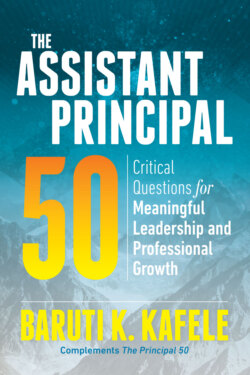Читать книгу The Assistant Principal 50 - Baruti K. Kafele - Страница 10
На сайте Литреса книга снята с продажи.
Q2. Is my assistant principalship all that I conceptualized it would be?
ОглавлениеLet me answer this question for myself first: No! In fact, I would answer with an emphatic no! I have articulated and written extensively over the years that the worst experience that I had in education was my very short tenure as an AP. Although I had no clear and consistent definition of the title Assistant Principal, I developed during my tenure as an AP a definition of what an AP was not.
During my tenure as an AP, my primary responsibility was student discipline. I was a full-time disciplinarian. That consumed my entire day, rooted in the climate and culture of the school. (I typically liken discipline to a micro issue and climate/culture to a macro issue.) In my school, we were so focused on the micro via me as school disciplinarian that we completely "missed the bus" on the macro—the climate and culture of the school. Consequently, from the time students entered the building until dismissal, my days were spent reading disciplinary referrals, lecturing and counseling students who were sent to me, and making decisions relative to the consequences of the actions outlined in the disciplinary referrals. During lunch period, I served as the supervisor of the cafeteria. After lunch period, I resumed my role as disciplinarian.
I also served as the teacher supply inventory clerk. (As I write this early in the morning on my balcony in Montego Bay, Jamaica, I have a wide smile on my face. However, the smile is one of disgust—a "smh," if you will. I'm reminiscing about the system that was put in place in my school where, in my capacity as AP, I maintained the supplies and photocopy paper inventory in a storage room. Teachers sent me requisitions daily and, when I wasn't disciplining students, I pushed a cart around the school delivering supplies and copy paper to teachers' classrooms—the second of my three core responsibilities as a AP.)
My third core responsibility was bus duty. Because our district was a magnet school district, our students came in from all over the city. My job was to greet the students in the morning (a good thing), get them settled, and see them off in the afternoon (also a good thing). (I will elaborate further on each of these in Chapter 7.)
The foregoing encapsulates how my days as an AP were spent, which was a far cry from what I'd envisioned based on what I'd learned in graduate school. Although I had no clear and consistent definition of what an Assistant Principal was, I never could have imagined that it was going to be like what I'd experienced. As I have looked back on the experience over the past two decades, it continues to pain me that because of the way that my role as AP was defined, the 30 teachers that I was to have supervised received little to no supervision from me. That translated to disaster for the students because both effective and ineffective teachers were being rewarded because as the teachers' evaluator of record, I was not in position to assist teachers with professional growth and development.
Is your assistant principalship all that you conceptualized it would be? Does your school culture enable you to do the things as a leader that your graduate school courses prepared you for? Are you being utilized optimally? Is your presence an asset to the teachers you supervise? Is your presence an asset to the students you lead? Are you being exposed to all facets of school leadership? The answers to these questions are vitally important because your position—Assistant Principal—is a vital one toward the overall success of any school.
